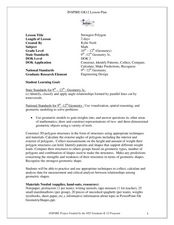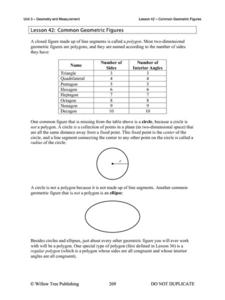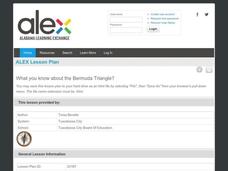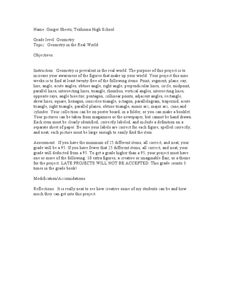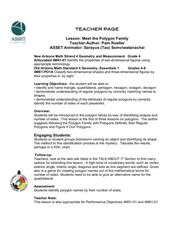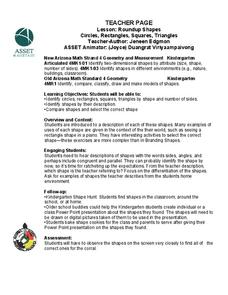Curated OER
Strongest Polygon
Students define and identify shapes by name. In this geometry lesson, students construct, identify and compare polygons based on the number of sides. They classify each shape based on their angle sum theorem.
Curated OER
Figure It Out - Polygons
Sixth graders explore different polygons. In this polygon lesson, 6th graders examine a rhombus, quadrilateral, parallelogram, and rectangles. Students compare and contrast polygons and research shapes on the Internet.
Curated OER
Area of irregular Polygons: Historical Motivator - Lewis and Clark Adventure
Seventh graders find the area of irregular polygons. In this lesson on calculating area, 7th graders use the adventures of Lewis and Clark as motivation to learn how to calculate the area of irregular polygons.
Curated OER
Parallel and Perpendicular Lines
Learners study parallel and perpendicular lines. For this parallel and perpendicular lesson, pupils explore 2-D shapes and determine if the sides are parallel or perpendicular.
Curated OER
Inching Our Way through Measurement
Learners review how to use an inch ruler and listen to the story, Inch by Inch by Leo Lionni. In this measuring lesson, students work in small groups to create an Inch Poster. Learners then use an inch ruler to measure different objects...
Willow Tree
Common Geometric Figures
Geometry could be called the study of figures. An overview of the figures found in a typical geometry course contains a study of different triangles, quadrilaterals, and regular polygons.
Alabama Learning Exchange
What You Know About the Bermuda Triangle?
Get lost in the classifications. Using the backdrop of the Bermuda Triangle, pupils classify it by angle and side measures. They also learn information about the triangle and its history.
Curated OER
Geometry in the Real World
Eighth graders complete a unit of lessons on basic geometry concepts. They participate in a variety of activities, culminating in a project that involves publishing a booklet or a poster that presents the major geometry concepts from the...
Curated OER
IGD: Perpendicular Bisector
High schoolers draw perpendicular bisectors. In this perpendicular bisectors lesson, students identify the perpendicular bisector in a polygon. They use web tools to create and measure perpendicular bisectors. High...
Curated OER
Angles, Parallel Lines, and Polygons
Students examine how to investigate polygons using an instrument of their own construction. They should be able to prove the general formula for the number of degrees in any polygon (including a triangle). Finally they investigate an...
Curated OER
How Many Regular Polyhedrons Are There In This or Any Universe?
Students examine the idea of "regularity" as it pertains to geometry. In this geometry lesson students complete several assignments that are part of trihedral angles and regular polyhedrons.
Curated OER
Polygons All Around Us!
Students explore the concept of polygon properties. In this polygon properties lesson plan, students draw polygons with different numbers of sides such as pentagons, octagons, hexagons, etc. Students identify different geometric shapes...
Curated OER
Meet the Polygon Family
Fourth graders investigate regular polygons. In this regular polygon lesson, 4th graders explore the attributes of different polygons. Students work in groups to complete a KWL chart regarding polygons.
Curated OER
Angle Benchmarks
Sixth graders discuss the characteristics of specific angles and then use the information to to identify and estimate given angles. The class goes outside, identifies north, and turns a specified amount of degrees. Using a given compass,...
Curated OER
Polygons Defined
Fourth graders explore polygons. In this polygon lesson, 4th graders sort polygons according to their properties. Students discover the connection between polygons and the Greek language.
Curated OER
Back to the Bees (Tesselations)
Sixth graders observe the creation of a tessellation with hexagons. In groups, they work with polygons to discover what shapes can be used to create tessellations and explore the angle measurements of each shape. Using internet websites,...
Curated OER
Up For Change?
Students explore similar objects. They participate in a series of hands-on, multimedia and online activities to examine how the edge length affects the angle measures, perimeters and areas of similar regular polygons. Students find the...
Curated OER
Flip's Flag
Fifth graders apply the symmetry and angle properties of polygons and use fractions to express the relationships between the areas of rectangles, squares, and triangles. They analyze various country flags and develop mathematical...
Curated OER
Geoboard Ideas
Learners build polygons on their geoboards. In this geometry lesson plan, students build and then draw it on paper and label it. Learners then switch with a partner to try an make a symmetrical shape.
Curated OER
Learning by Logic - Total Surface Area
Geometers calculate the area of plane surfaces using the formulas for the area of a square, rectangle, and triangle. They develop the formula for calculating the total surface area of two geometric solids: the cube and rectangular prism.
Curated OER
Roundup Shapes
Shapes are all around us! Kindergartenrs identify shapes in their world and guess the shape being described. They participate in a shape hunt.
Curated OER
Tessellation Trial and Error
In this interactive instructional activity, students review attributes of equilateral polygons. They are introduced to the concept of a tessellation. Using protractors and pre-cut shapes, students arrange a variety of tiles to create...
Curated OER
Reflections
Fifth graders create a reflection of a poygon using a Mira. They discover that a line connecting a vertiex of a polygon and the corresponding vertex of its reflection is perpendicular to the line of reflection. Students create a glide...
Curated OER
Geometry in Tessellations
Pupils examine tessellations and their geometric properties. Students explore the concept of tessellations and lines, planes, angles, and polygons. Pupils experiment with the area and perimeter of polygons. Students analyze...
